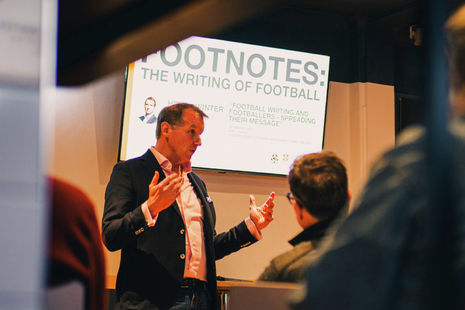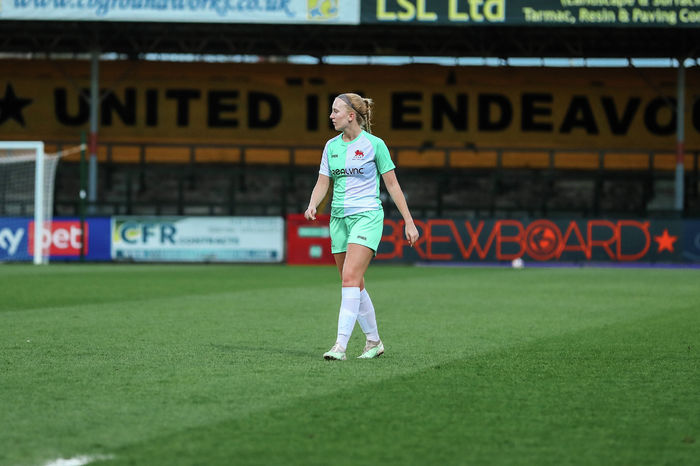The writing of football: from Scottish sectarianism to cliched tortologies
After attending this engaging seminar series, Barney Blackburn offers a host of lessons learnt on football writing

The cleverly titled ‘Footnotes’, a seminar series based on the writing of football, took place in four installments earlier this calendar year. In a joint collaboration between Cambridge United and the university, these free-to-attend talks covered a lunging range of topics, from Scottish anthropology to Colombian nation-building. I was lucky enough to attend all four talks, exploring the beautiful game through an exciting new perspective.
Proceedings kicked off with the visiting Adam Hurrey, a podcast host with experience interviewing the likes of Keir Starmer on his ‘Football Cliches’. Hurrey’s observations on the writing of football were entertainingly astute: both mocking the tortological nature of a ‘footrace’, and asking the lecture theatre to consider any other scenario in which ‘guile’ or ‘talisman’ could be used in daily life, unless to describe industrious midfielders or sharp-shooting strikers.
Furthermore, he highlighted the subtle differences in the usage of ‘mouth-watering’ compared to ‘eye-watering’ in a footballing sphere, while questioning the differences between kicking the ball ‘upfield’ or ‘downfield’ – both, confusingly, referring to the ball moving forward. I was quietly pleased to hear Hurrey discredit the likelihood of football writing being overtaken by Artificial Intelligence – from his own experience developing generative models, the writing of football cannot be shackled by simple coding. Hurrey’s discussion on the cliches we so unwittingly use in football writing was an exciting way to kick off Footnotes.
“What would two rival Old Firm fans actually do if sat next to each other on a train?”
The second seminar introduced me to Joseph Webster, a professor at the faculty of Divinity, who led an informative discussion on his own experience as an anthropologist among rival football fans (Celtic and Rangers) in Glasgow. With Rangers traditionally associated with Protestantism and Celtic aligning themselves with Catholicism, Webster explained how fan tension had led to the Offensive Behaviour at Football and Threatening Communications act being introduced by the Scottish Parliament in 2013, a law that Webster fought to repeal after its ensuing decimation of the football fan’s relationship with the police.
The decision to ban potentially incendiary football chants was deemed unenforceable and unjustified by Webster, who advocated for an educational approach towards reducing harmful animosity between fans – rather than encouraging on-the-spot punishment. To this day, it is the only piece of legislation enacted by the Scottish Parliament to be successfully repealed.
Of course, as many football fans will begrudgingly admit, Webster astutely noted that to have a strong club, you often need the idea of a firm competitor. Celtic may have initially revelled in Rangers’ bankruptcy of the 2010s – but the removal of an ‘other’ certainly reduces a club’s competitiveness. Amidst discussions of such genuine fan hatred, Webster closed his conversation with another clever quandary – what would two rival Old Firm fans actually do if sat next to each other, on a train, for example?
“After all, the man has interviewed Pelé twice”
The next talk saw the esteemed journalist Henry Winter visit Cambridge, speaking at the Cledara Abbey stadium. The former Chief Football Writer for The Times regaled a packed crowd with tales of an extraordinary life: after all, the man has interviewed Pelé twice. Hot off the plane from England duty, Winter was keen to put forth his stance on the then-upcoming Club World Cup, calling the tournament immoral and explaining that he had directly expressed this opinion to FIFA over the last few days.
Such an esteemed career had humble beginnings: in one of Winter’s early positions, he revealed that he found himself in a spot of bother over a headline that he had written. It turned out that ‘Soviets invade Lapland’ wasn’t quite appropriate to describe Russia joining Formula 1, or at least, the Russian embassy thought so, and lodged a formal complaint! Winter’s subsequent experience of writing football narrative has been wonderfully varied, from writing Steven Gerrard’s auto-biography (which the former Liverpool captain only made four changes to), to Michael Carrick – as per his on-pitch play – being a meticulous perfectionist when it came to editing his own journalistic portrayal.
Winter did question if footballers actually need the media anymore, thanks to the rapid growth of self-guided expression via apps like Instagram. His enthralling introspective into his prestigious world of football writing was an enjoyable experience for all involved, and like all other speakers, Winter was kind enough to stick around at the end and chat with attendees.
“Women’s football had once been seen as an anti-national game”
The final talk in the series focused on the role of women’s football as a nation building tool in Colombia, led by the engaging Dr Peter Watson. Once again, a seemingly abstract topic captivated an attentive audience, as Watson led discussions surrounding the progression from oversexualised reporting in Colombia, to the nation offering their full support to the women’s team during the 2023 World Cup campaign. Watson reminded us that women’s football had once been seen as an anti-national game, where women’s only promotion was focused on their bodies, and – as Colombian presidents emphasised – their success centred around their status as beautiful young women rather than as inspirational sportspeople. Yet 2023 saw a change in the narrative. With starlet Linda Caicedo – now playing for Real Madrid – at the helm, the team filled the void left by the men’s failure to qualify for the 2022 World Cup, and in turn captivated the nation.
Watson’s linguistic breakdown of the progression in support for Colombia’s team was incredibly incisive, showing how current president Gustavo Petro exhibited support but didn’t state that the team represented Colombia, a common trope amongst his descriptions of their male counterparts. Led by Linda Caicedo, a cancer-surviving, lesbian, afro-colombian – and hence a far cry from misogynistic typologies of what a female footballer should be – Colombia’s progression from portraying female footballers as infantilised showgirls to gritty sportswomen has helped to make the struggle for equality visible in Colombia, with players keen to engage with gender-based activism throughout recent decades. Watson’s presentation was well-paced and meticulously researched, closing a seminar series that investigated the world of football writing in a multitude of creative ways.
Collaborations between Cambridge United Football Club and Cambridge University are rising in frequency, and the Footnotes seminar series highlighted the fruits of a burgeoning relationship between the two powerful entities, championing one another’s commitment to sports and academia.
 News / Judge Business School advisor resigns over Epstein and Andrew links18 February 2026
News / Judge Business School advisor resigns over Epstein and Andrew links18 February 2026 News / Hundreds of Cambridge academics demand vote on fate of vet course20 February 2026
News / Hundreds of Cambridge academics demand vote on fate of vet course20 February 2026 News / Petition demands University reverse decision on vegan menu20 February 2026
News / Petition demands University reverse decision on vegan menu20 February 2026 News / CUCA members attend Reform rally in London20 February 2026
News / CUCA members attend Reform rally in London20 February 2026 News / Gov grants £36m to Cambridge supercomputer17 February 2026
News / Gov grants £36m to Cambridge supercomputer17 February 2026










